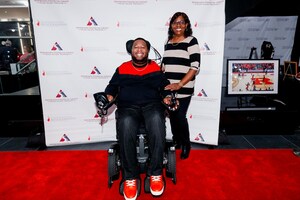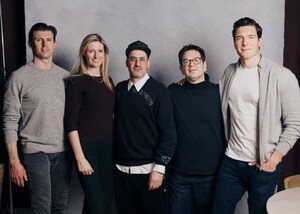People Living with Paralysis Share Their Experiences with Online Dating
This article is by Nate Herpich on behalf of the Christopher & Dana Reeve Foundation Paralysis Resource Center (PRC). The PRC is a national resource which provides a road map of complimentary services and programs to empower individuals living with paralysis.
SHORT HILLS, N.J., Dec. 2, 2014 /PRNewswire-USNewswire/ -- Sure, for some, Valentine's Day is a time to enjoy current relationships. But for many others, it's a time to reflect on future aspirations in love. In 2014, this often means thinking about online dating: A recent report from the Pew Internet and American Life Project found that one in every ten Americans has used an internet dating site or mobile dating app.
People living with paralysis have many options for meeting people online. In addition to mainstream dating sites such as Match.com, eHarmony, and OkCupid, there are sites tailored to those living with disabilities such as Dating4Disabled and eDateAbility.
Of course, many people with paralysis have very specific wants and needs for meeting a prospective partner, as well as their own unique fears and trepidations that come with entering the online dating scene. Those with disabilities also need to be aware that some online daters are motivated more by fetishism for the disabled and specific disabilities (i.e. devoteeism), than in finding a lasting partner. And all online daters should be wary of protecting their security online: It's a non-trivial decision whether to disclose information such as your phone number before getting to know someone. Many online daters create a special email address to correspond with their profile (Check out these tips from Match.com on safe internet dating).
Still, online dating can represent an opportunity in exploration, both of yourself, and of the world around you, explains Dr. Dan Gottlieb, a therapist living with spinal cord injury. Dr. Gottlieb is the author of the upcoming book The Wisdom We're Born With: Restoring Faith in Ourselves.
"I recommend approaching online dating openly," he explains. "Be awake and aware as you start your journey, and you will learn a lot about what people are like and how they react to you, and you will also learn a lot about yourself, and what you're attracted to. I can't promise you'll find the love of your life through online dating, but I can guarantee a learning experience."
The Single Lady
Four years ago, Kuen Tang decided to sign up for online dating. It was a completely new world for her, as she had married her first serious boyfriend and was now separated. Not only was Kuen newly single for the first time in a decade, she was a bit wary about how she might be received online as a c6/7 quadriplegic. But it was important to her to disclose her disability in her public profile. "My thinking is, sure, you may have less responses, but the ones you do have will usually be from people who are more open-minded."
Kuen, a 35-year-old comic book creator who lives in Edmonton, Canada, began with the free dating site Plenty of Fish, but found most people to be more interested in "the pretense of dating" than actually getting to know her as a person: in short, sex, and sometimes, devoteeism. However, through a very selective process and luck, she has met a "few good guys." She now uses eHarmony instead, but has yet to make a romantic match. "I'm still keeping my options open!" she says.
At first Kuen says that she first approached online dating by being open-minded and overly optimistic: "I believed that I should give people who are interested in me a chance, even if I wasn't really interested in them," but has since realized the error of her ways. Once she became more self-confident and selective, she started to meet great people.
Kuen's advice for daters living with disabilities is simple, but profound: "Don't sell yourself short. If the right person comes along, they will come along. Don't invest in wrong relationships. Be open, be patient, and be hopeful, but not hopelessly romantic. Finding a fairy tale is rare!"
The Budding Romance
About a month and a half ago, Rochester, New York thirtysomethings Luticha Doucette and Don Schlaich met on OkCupid. Don messaged Luticha, one of his "potential matches" because he says she looked "cute and geeky," which is exactly what he likes.
Luticha, a C5/8 quadriplegic, had recently received a disturbing message to her profile, and was feeling pessimistic about online dating. But she became immediately intrigued by Don's note, and his love of books and food. They began by chatting online, and quickly realized that they shared similar values as well. It was a nice change for her: In two years of online dating, she's had little success.
"I've struggled with whether to mention to people that I'm a wheelchair user in my profile," says Luticha, who works as a scientist. "At first, I didn't, and that didn't go over well with people once they found out. And then I did, and I received messages from creepers with fetishes for people in wheelchairs. Really, my experience with online dating has run the gamut from very bad, to very good."
Luticha recognizes the real stigma that is attached to being disabled on many of the more mainstream dating sites. In the end, she decided to make her profile more "about me, and what I care about." Her photos show that she is living with a disability.
Don, who is able-bodied, says that he's tried online dating for the better part of a decade, but hasn't had much luck finding someone who is right for him. He calls Luticha, "an impressive woman" and looks forward to more dates over the coming months.
"To some extent, dating Luticha is like dating anyone else," says Don, an IT technician. "Sure, it takes a bit longer to do certain things, but what's important is that I'm really enjoying getting to know her as a person."
The Happy Married Couple
Raleigh, North Caroline couple Ami Claxton and Chad Harris met during the infancy of online dating, via Yahoo personal ads ten years ago. They've now been happily married for eight years, but both distinctly remember their first meeting in cyberspace.
"Chad's profile was the first one to come up," remembers Ami, who is able-bodied. "I looked at a bunch of profiles after that, but nothing else compared to his, so I sent him a 'wink' and the rest is history."
"I had been online for a number of years, but only had a few responses," says Chad, a C4/5 quadriplegic. "I always put in my profile that I'm a quad, I just figured I should be fair and upfront about it. I wanted whomever it was to know what they were getting into. If they'd really wanted to date me, I'd know it was because they liked me, for me."
An epidemiologist by trade, Ami was familiar with the day to day that people living with paralysis experience, so this didn't bother her. For their first date, they had Chinese takeout, and Ami even met Chad's stepfather and mom. Soon after, they fell in love.
"Communication is the main key," says Chad. "Sure, we've had some rough spots over the years. But we have a very strong bond, something that is very rare."
Chad remembers the dating days, and how scared and vulnerable it can feel to put yourself out there, especially when you're living with paralysis. But ultimately, he says, find a way to show who you are and let it shine through your profile; someone just might like you for who you are. After all, Chad and Ami found each other, after connecting on simple shared interests like European travel and drinking wine.
"Do I get the 'Why would you marry someone with a disability? Yes, and constantly," says Ami. "And I get really sick of being asked, to be perfectly honest.
"But my best answer is to introduce them to my husband. To let them get to know him, to understand he is just a person under the layers of the wheelchair, behind that chin control and head switch. Is this life hard? Yes, it really, really is. Harder than life would be if he weren't disabled? Yes, by 100 fold. But I would do it all again because I love him and he makes it all worth it at the end of the day."
'The Bottom Line is Self-Compassion'
In the end, the decision whether or not to sign up for online dating is an intensely personal one, and it's not for everyone. And for those who do decide to date online, there is a strong possibility of getting hurt during the process, says Dr. Gottlieb. "I remember the searing pain I felt in my own romantic life after I was injured," he says. "I asked myself, am I even lovable? Or am I too broken?"
Dr. Gottlieb, a self-admitted tender heart, decided to persevere, and is now in a loving relationship.
"Everyone with spinal cord injury is afraid of something, and certainly, it makes sense that we might be afraid of online dating," he says.
"Still, if you think about how many times in your life you've been hurt, and where you are now, it helps to remember that we do heal. The bottom line in all of this is, always maintain that sense of self-compassion. Remember your resilience, and that, no matter what happens, you are going to be fine."
The Christopher & Dana Reeve Foundation is dedicated to enhancing care and providing critical support to the paralysis community in the here and now. Visit the Paralysis Resource Center at paralysis.org and take advantage of the free resources available.
CONTACT: Angela Cantillon, 1-800-539-7309
Logo - http://photos.prnewswire.com/prnh/20100511/REEVELOGO
To view the original version on PR Newswire, visit:http://www.prnewswire.com/news-releases/people-living-with-paralysis-share-their-experiences-with-online-dating-300003345.html
SOURCE Christopher & Dana Reeve Foundation
Related Links
WANT YOUR COMPANY'S NEWS FEATURED ON PRNEWSWIRE.COM?
Newsrooms &
Influencers
Digital Media
Outlets
Journalists
Opted In





Share this article